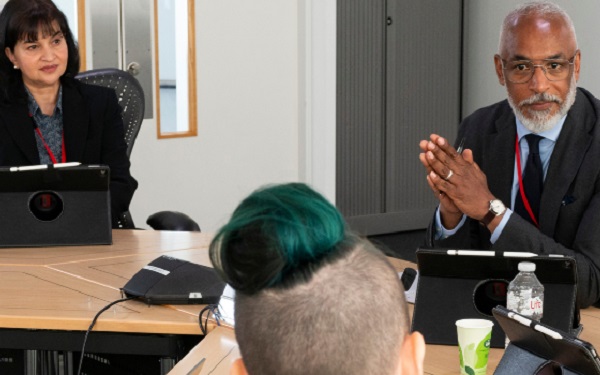
Researchers from British universities have opened a study into the experiences of witnesses in health or social care fitness to practise (FtP) proceedings to assess how they can be better supported.
The study, believed to be the first of its kind, will focus on cases where either the witness themselves or their family member may have been seriously harmed or died because of a registrant’s practice or care.
Over the next 30 months, researchers for the project, Witness to harm, holding to account, aim to find out the impact of being a witness in FtP investigations and hearings, what support they receive from regulators and what support they would like.
Filling research gap
Professor Louise Wallace, co-principal investigator from the Open University, said: “We know that ‘victims’ in criminal court hearings can suffer harm all over again by having to relive their experience.
“There is no independent research on what happens when people give evidence in a professional regulatory tribunal, or whether the support offered by regulators to witnesses helps them or could be improved.
“Our study aims to gain unique insights, and from these findings, create resources and guidance that enables people to be better supported when they engage with fitness to practise proceedings.”
The Open University (OU), Manchester Metropolitan University, the University of Oxford, the University of Glasgow and The University of Edinburgh will work with six of the 13 UK health and social care regulators to analyse the experience of members of the public who act as witnesses.
Researchers will identify current best practice and potential improvements to how regulators engage with the public throughout FtP processes.
They will work with all 13 regulators, including Social Work England, along with employers of health and social care practitioners to produce free films of witnesses‘ experiences for members of the public, a free eight-hour OpenLearn course, and podcasts.
Researchers will develop training materials for professionals who may support their staff, patients and service users through the fitness to practise process.
And they will put forward recommendations for the public, professional bodies, employers, and regulators on what could be improved.
A Social Work England spokesperson said: “Giving evidence as part of fitness to practise hearings can be difficult and by taking part in this research we want to make sure that people receive the best support possible.”
Related articles
- Social workers more likely to face fitness to practise cases and removal than health staff, says study
- Fewer hearings, less stress and more social work involvement: how new regulator is reforming fitness to practise
- Tackling fitness to practise backlogs, refreshing CPD and a focus on students: the year ahead for Social Work England
Methodology
Researchers plan to survey witnesses and interview members of regulators’ public engagement groups, witnesses who have used regulators’ support services and health and social care employers about how they support colleagues who have been harmed by a registrant co-worker.
They will assess the readability and content of regulators’ FtP witness support materials.
Researchers will study cases completed in the past three years involving harm, analyse the case materials and interview witnesses, regulator staff and adjudicators.
They will film reflective narratives of up to 12 people’s experiences of FtP hearings, including their needs for and use of witness support, legal, complaints, health and care services.
The Professional Standards Authority, which oversees the UK’s health and social care regulators, and all 13 of the regulators are advisers on the project, as is the Harmed Patients Alliance, which supports people harmed by the healthcare system.
Lawyers involved in cross examining witnesses in FtP, employers and professional organisations will also be invited to contribute to the research.
The National Institute for Health Research (NIHR) provided funding for the project of just under £750,000.




 Bournemouth, Christchurch and Poole
Bournemouth, Christchurch and Poole  Hampshire County Council
Hampshire County Council  Oxfordshire County Council
Oxfordshire County Council  South Gloucestershire Council
South Gloucestershire Council  Wokingham Borough Council
Wokingham Borough Council  Webinar: building a practice framework with the influence of practitioner voice
Webinar: building a practice framework with the influence of practitioner voice  ‘They don’t have to retell their story’: building long-lasting relationships with children and young people
‘They don’t have to retell their story’: building long-lasting relationships with children and young people  Podcast: returning to social work after becoming a first-time parent
Podcast: returning to social work after becoming a first-time parent  How managers are inspiring social workers to progress in their careers
How managers are inspiring social workers to progress in their careers  Workforce Insights – showcasing a selection of the sector’s top recruiters
Workforce Insights – showcasing a selection of the sector’s top recruiters  Unlocking independence: how ASDAN gives care leavers choice and control over their future
Unlocking independence: how ASDAN gives care leavers choice and control over their future 

 Facebook
Facebook X
X LinkedIn
LinkedIn Instagram
Instagram
If SWE was committed to giving the best possible support to witnesses it would progress hearings much quicker.
I am sure this is going in Parallel with studies that focus upon the mental health and wellbeing of social workers brought to Fitness to Practice, right…… Right?
Exactly…..I could comment more but I think your comments are clear enough that social workers mental heath and wellbeing are always overlooked along with their lack their safety when our visiting families.